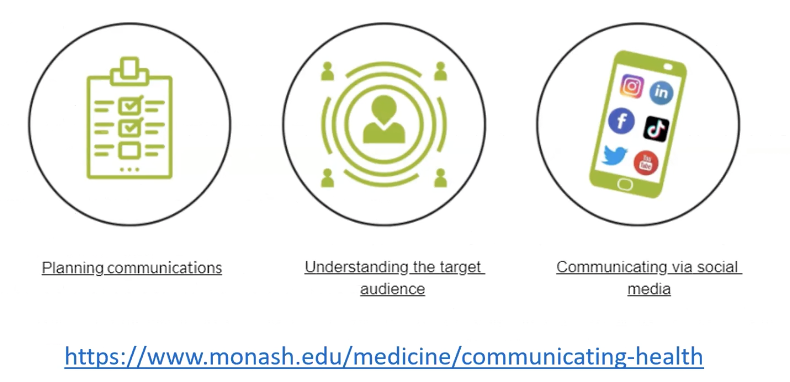Written by Sento Kai Kargbo
Acknowledgements: A sincere thank you to our host, Shane McAuliffe, and presenters for their time and insights and to the NNEdPro ANZ network for their continued efforts in promoting nutrition education among health professionals in line with the NNEdPro mission.
Webinar Presenters: Dr. Tracy McCaffrey, Breanna Lepre, and Dr Crowley
For our final workshop of the 2021 webinar series, NNEdPro and IANE members, including members from our regional networks, convened to learn more about health communications in the social media era and the work of the NNEdPro ANZ regional network in medical nutrition education. This blog summarises the proceedings from the webinar session, including current research and key themes.
Our first presentation of the evening by Dr. Tracy McCaffrey covered the topic of health communications in the social media/online era. Whilst bringing together people from across the world to share ideas and cultures and improving communication in a number of ways, social media platforms present a host of challenges for nutrition and health professionals in communicating health. This is especially true of the wave of misinformation and disinformation we have witnessed so far during the COVID-19 pandemic. Additionally, person-centred care, a guiding principle in health promotion, is difficult to achieve online mostly due to the competing voices on social media from health professionals and so-called influencers with quick fixes and solutions to the nutrition and health concerns individuals face. For this reason, it is important that health professionals adopt a communications strategy tailored to online/social media platforms in order to ensure reach whilst maintaining clear, consistent, and accurate messaging. As such researchers from Monash University in Australia formulated a health communication toolkit for improved nutrition and health education online via social media platforms.

Image 1. Health Communication Toolkit sourced from Monash University website.
There are six (6) steps involved in planning health communications online;
-
Set goals
-
Assess
-
Understand your audience
-
Refine objectives
-
Strategy
-
Evaluate
A key aspect of communicating online, like other means of communication, is knowing and understanding your audience. Dr McCaffrey emphasised the need to learn the language of your target audience to better understand what is important to them and find messages that can motivate and inspire. In the end of her presentation, Dr McCaffrey shared key tips in communicating health via social media;
-
Choose social media platform already used by audience.
-
Quality social media content takes skills and time.
-
Body dissatisfaction in triggered by social media.
-
Strategies promoting successful engagement vary.
-
Understand attitudes and behaviours.
-
Use a positive tone of voice.
-
Show your credentials and be authentic.
-
8. Having engaged followers matter more than total numbers.
Our next presenters, Breanna Lepre and Dr Crowley discussed medical nutrition education, referencing case studies and lessons learned from ongoing research in Australia and New Zealand. Breanna Lepre presented key findings from ongoing PhD research which is broadly focused on developing a competency framework towards improving nutrition education in medicine. Results from 22 semi-structured interviews conducted online with a cohort of UK and Australian doctors indicate that the frequency of nutrition advice provided by medical professionals vary considerably from one doctor to the other. Although participants recognised the importance of nutrition care, they understand that they are ill-equipped in nutrition-related knowledge and skills but also in relation to the systems that might support integrated care.
In conclusion, nutrition education remains insufficiently incorporated in medical training globally. A key barrier to nutrition care in medical practice is insufficient nutrition-related knowledge and skills among medical professionals. Insufficient consultation time is also reported to impact the quality of nutrition care provided to patients. As such, concerted efforts are required at the level of the individual and institution in order to address the need for improved nutrition care in medical settings for better health outcomes.
References
Lepre B, Crowley J, Mpe D, Bhoopatkar H, Mansfield KJ, Wall C, Beck EJ. Australian and New Zealand Medical Students’ Attitudes and Confidence towards Providing Nutrition Care in Practice. Nutrients. 2020; 12(3):598.
Lepre B, Mansfield KJ, Ray S, Beck EJ. Nutrition Competencies For Medicine: An integrative Review and Critical Synthesis. BMJ Open. 2021;11:e043066. Doi:10.1136/bmjopen-2020-043066.
Lepre B, Mansfield KJ, Ray S, Beck EJ. Reference to Nutrition in Medical Accreditation and Curriculum Guidance: A Comparative Analysis. BMJ Nutrition, Prevention and Health. 2021;bmjnph-2021-000234. Doi:10.1136/bmjnph-2021-000234.
Lepre B, Mansfield KJ, Beck EJ. Stakeholder engagement in competency framework development in health professions: A systematic review. Frontiers in Medicine. 2021;8:759848.
.png)